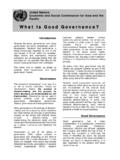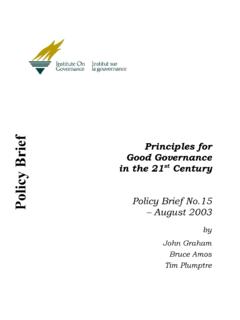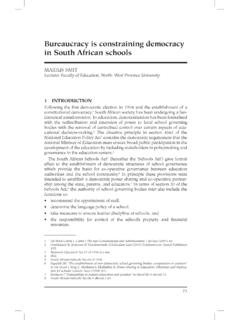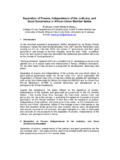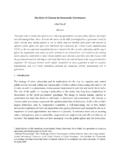Transcription of Protocol on good governance and democracy rev …
1 Economic Community of West African States Communaut Economique des Etats de l Afrique de l Ouest Protocol A/SP1/12/01 on democracy and good governance Supplementary to the Protocol relating to the Mechanism For Conflict Prevention, Management, Resolution, Peacekeeping and Security Executive Secretariat Dakar, December 2001 Page 2 PREAMBLE WE, THE HEADS OF STATE AND GOVERNMENT OF THE MEMBER STATES OF THE ECONOMIC COMMUNITY OF WEST AFRICAN STATES (ECOWAS); MINDFUL OF the ECOWAS Treaty signed in Cotonou on 24 July 1993, notably its Article 58; MINDFUL OF the Protocol relating to the Mechanism for Conflict Prevention, Management, Resolution, Peacekeeping and Security signed in Lome on 10 December 1999; CONSIDERING all the issues enumerated or reaffirmed in the preamble to the Protocol of 10 December 1999 referred to above; MINDFUL OF the principles set out in the OAU Solemn Declaration on Security, Stability, Development and Cooperation in Africa adopted in Abuja on 8 and 9 May 2000 and the Decision AHG.
2 DEC 142 (XXV) on the framework for OAU s reaction to unconstitutional change of government, adopted in Algiers in July 1999; CONSIDERING the Harare Declaration adopted by the Commonwealth on 20 October 1991 and the Bamako Declaration adopted by the member countries of the Francophonie on 3 November 2000; CONSIDERING also the Cotonou Declaration adopted on 6 December 2000 at the end of the 4th international conference on new or restored democracies; RECALLING that women s rights have been recognised and guaranteed in all international human rights instruments, notably the Universal Declaration of Human Rights, the African Charter on Human and Peoples Rights and the Convention on the Elimination of all forms of Discrimination Against Women; Page 3 MINDFUL of the ratification of the African Charter on Human and Peoples Rights and other international human rights instruments by the majority of the Member States and their solemn commitment to eliminate all forms of discrimination and harmful practices against women; CONCERNED about the increasing wave of international terrorism; CONCERNED also about the increasing incidence of conflicts caused by religious intolerance, political marginalisation and non-transparent elections; HAVING OBSERVED that to become really effective, the Protocol of 10 December 1999 needs to be complemented through the incorporation of provisions concerning issues such as prevention of internal crises, democracy and good governance , the rule of law, and human rights.
3 HAVING DECIDED to enhance the ECOWAS Mechanism for Conflict Prevention, Management, Resolution, Peacekeeping and Security; HAVE AGREED AS FOLLOWS: DEFINITIONS: The terms and expressions used in the present Supplementary Protocol have the same meanings as those used in the Protocol of 10th December 1999. The list of definitions is completed as follows: Treaty means the Revised Treaty of the Economic Community of West African States (ECOWAS) signed in Cotonou on 24 July 1993; Protocol means the Protocol relating to the Mechanism for Conflict Prevention, Management, Resolution, Peacekeeping and Security, signed in Lome on 10th December 1999; Page 4 Supplementary Protocol means the Protocol on democracy and good governance Supplementary to the Protocol relating to the Mechanism for Conflict Prevention, Management, Resolution, Peacekeeping and Security; Community means the Economic Community of West African States referred to under Article 2 of the Treaty; Member State or Member States means a Member State or Member States of the Community as defined in paragraph 2 of Article 2 of the Treaty.
4 Community citizen or citizens means any national (s) of Member States who satisfy the conditions stipulated in the Protocol defining Community citizenship; Court of Justice means the Court of Justice of the Community established under Article 15 of the Treaty; Authority means the Authority of Heads of State and Government of the Economic Community of West African States established by Article 7 of the Treaty; Mediation and Security Council means the Mediation and Security Council as defined by Article 8 of the Protocol ; Defence and Security Commission means the Defence and Security Commission as defined in Article 18 of the Protocol ; Executive Secretary means the ECOWAS Executive Secretary appointed in accordance with Article 18 of the Treaty; Executive Secretariat means the Executive Secretariat established under Article 17 of the Treaty; Deputy Executive Secretary means the Deputy Executive Secretary in charge of Political Affairs, Defence and Security as referred to in Article 16 of the Protocol ; Page 5 ECOMOG means the ECOWAS Cease-fire Monitoring Group, which constitutes the Community s intervention force as defined in Article 21 of the Protocol relating to the Mechanism etc; Armed Forces includes the army, Airforce, Navy, and Gendarmerie; Security Forces the Police, Gendarmerie, National Guards and other Forces assigned with security.
5 CHAPTER 1 PRINCIPLES The provisions of this chapter complement and clarify the principles set out in Article 2 of the Protocol of 10 December 1999. SECTION I: CONSTITUTIONAL CONVERGENCE PRINCIPLES Article 1: The following shall be declared as constitutional principles shared by all Member States: a) - Separation of powers - the Executive, Legislative and Judiciary. - Empowerment and strengthening of parliaments and guarantee of parliamentary immunity. - Independence of the Judiciary: Judges shall be independent in the discharge of their duties. - The freedom of the members of the Bar shall be guaranteed; without prejudice to their penal or disciplinary responsibility in the event of contempt of court or breaches of the common law. Page 6 b) Every accession to power must be made through free, fair and transparent elections.
6 C) Zero tolerance for power obtained or maintained by unconstitutional means. d) Popular participation in decision-making, strict adherence to democratic principles and decentralisation of power at all levels of governance . e) The armed forces must be apolitical and must be under the command of a legally constituted political authority; no serving member of the armed forces may seek to run for elective political. f) Secularism and neutrality of the State in all matters relating to religion; freedom for each individual to practise, within the limits of existing laws, the religion of his/her choice everywhere on the national territory. The secularism shall extend to all parts of the State, but shall not deprive the State of the right to regulate, with due respect to human rights, the different religions practised on the national territory or to intervene when law and order break down as a result of any religious activity.
7 G) The State and all its institutions belong to all the citizens; therefore none of their decisions and actions shall involve any form of discrimination, be it on an ethnic, racial, religion or regional basis. h) The rights set out in the African Charter on Human and People s Rights and other international instruments shall be guaranteed in each of the ECOWAS Member States; each individual or organisation shall be free to have recourse to the common or civil law courts, a court of special jurisdiction, or any other national institution established within the framework of an international instrument on Human Rights, to ensure the protection of his/her rights. Page 7 In the absence of a court of special jurisdiction, the present Supplementary Protocol shall be regarded as giving the necessary powers to common or civil law judicial bodies.
8 I) Political parties shall be formed and shall have the right to carry out their activities freely, within the limits of the law. Their formation and activities shall not be based on ethnic, religious, regional or racial considerations. They shall participate freely and without hindrance or discrimination in any electoral process. The freedom of the opposition shall be guaranted. Each Member State may adopt a system for financing political parties, in accordance with criteria set under the law. j) The freedom of association and the right to meet and organise peaceful demonstrations shall also be guaranteed. k) The freedom of the press shall be guaranteed. l) All former Heads of State shall enjoy a special status including freedom of movement. They shall enjoy special benefits compatible to their status as former Heads of State.
9 SECTION II: ELECTIONS Article2 1. No substantial modification shall be made to the electoral laws in the last six (6) months before the elections, except with the consent of a majority of Political actors. 2. All the elections shall be organised on the dates or at periods fixed by the Constitution or the electoral laws. Page 8 3. Member States shall take all appropriate measures to ensure that women have equal rights with men to vote and be voted for in elections, to participate in the formulation of government policies and the implementation thereof and to hold public offices and perform public functions at all levels of governance . Article 3 The bodies responsible for organising the elections shall be independent or neutral and shall have the confidence of all the political actors.
10 Where necessary, appropriate national consultations shall be organised to determine the nature and the structure of the bodies. Article 4 1. Each ECOWAS Member State shall ensure the establishment of a reliable registry of births and deaths. A central registry shall be established in each Member State. States shall cooperate in this area with a view to exchanging experiences and where necessary providing technical assistance to each other in the production of reliable voters lists. Article 5 The voters lists shall be prepared in a transparent and reliable manner, with the collaboration of the political parties and voters who may have access to them whenever the need arises. Article 6 The preparation and conduct of elections and the announcement of results shall be done in a transparent manner. Page 9 Article 7 Adequate arrangements shall be made to hear and dispose of all petitions relating to the conduct of elections and announcement of results.


